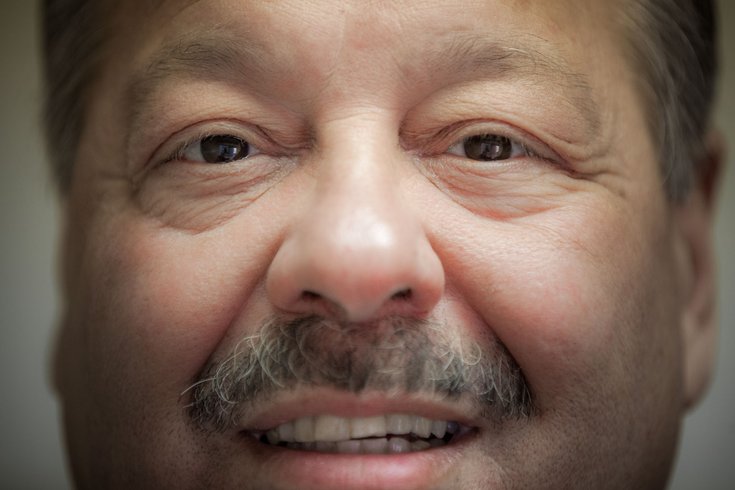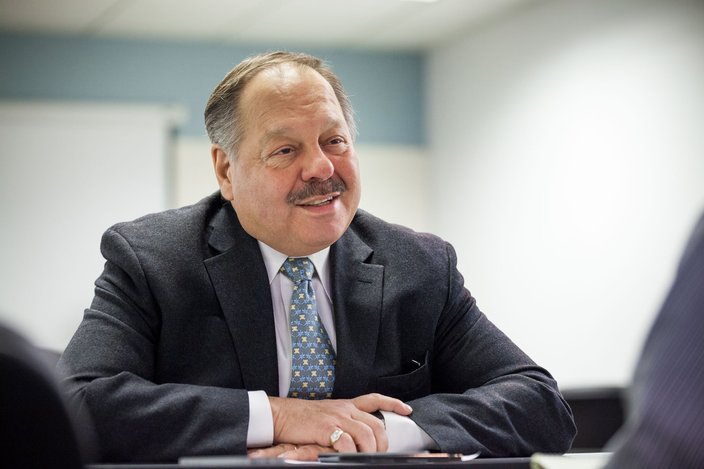Nelson Diaz became the first Latino elected to the Philadelphia Court of Common Pleas. His career since yielded work as a counselor to the U.S. Department of Housing and Urban Development, the city solicitor's office and Dilworth Paxon. Now, he aspires to become mayor.
But can Philadelphia fall in love with Diaz — or any of the other six mayoral candidates?
The exercise, developed by psychologist Arthur Aron, caused two strangers to fall in love by having them answer
36 questions that gradually grew more intimate. Then, Aron had the couple stare into one another’s eyes for four minutes.
In the hopes of getting a more intimate portrayal of the people running for the city’s top office, PhillyVoice asked the seven mayoral candidates to sit down with us and answer some of Aron's questions. Four of the candidates responded, including Diaz.
Here’s what Diaz had to say. (Some responses have been edited for brevity.)
PhillyVoice: What would constitute a perfect day for you?
Nelson Diaz: That I’ve won the election. That’s a perfect day.
PV: When did you last sing to yourself? To someone else?
ND: I sing to myself a lot because I love gospel music. I put the local gospel station on. In the car, or if I’ve got my earphones on, I’ll sing along to the gospel music. Gospel is my favorite kind of music. It’s also inspirational, so it gets you through the day.
To someone else? Yeah, my wife. I used to sing because she became sort of a dream to me. There was a song when I was growing up, which was "Once Upon A Time." I used to sing to her all the time. Then, once the reality came through – she was my wife – I don’t sing it as frequently, since the "Once Upon A Time" sort of happened. It’s a very, very old doo-wop song from the '60s. She’s always wondering why don’t I keep singing it to her anymore. I say, "You’re the reality now." "Once Upon A Time" happened.
PV: Do you have a secret hunch about how you will die?
ND: I assume that a lot of it will be in service. I don’t believe in retirement. For 45 years, I’ve been doing service to others. I would think it would be in service to someone or exerting myself too much or doing too much in terms of public service as a civic individual. The other way is if I went to my dream, which is to be a baseball player, going to one of those dream camps and pulling a muscle or hurting my heart while I’m playing. That’s another one — those winter camps that the pro teams run. Those are the only two ways that I think I would overly exert myself and kill myself.
PV: If you could change anything about the way you were raised, what would it be?
ND: The poverty was tough and the lack of knowledge of what was available in terms of education for me. I had a scholarship to Wharton that I turned down. I wish I had taken the scholarship. It would have made life a little easier financially during a period of time when I had three children.
I think those things would have been very different in my life. I never thought I was going to be a lawyer. Philadelphia has been very good to me. The legal profession has been exciting and challenging for my ability to work on issues that I probably would have never worked on.
But I would say the tough times were until I was 10 years old — the lack of understanding the language, the lack of having an ability to have a stronger body. Before 10, I would get bullied. Once I became stronger, that was the last time it ever happened. I learned from that experience. Those are sort of the main events in my life.
PV: If you could wake up tomorrow having gained any one quality or ability, what would it be?
ND: Yeah, I would have wanted to play Major League Baseball. That would have been a lot of fun. I always tell Judge (Michael) Stiles, who was my colleague in the Court of Common Pleas, he had a dream job when he left the U.S. Attorneys Office, which is to be (an executive for) the Phillies. If anything, I would love to be the commissioner of Major League Baseball so that I could attend any game that I wanted to attend. I’d go to all the ballparks and have a chance to see the great ones instead of just watching on TV. That would have been a dream time – baseball.
Nelson Diaz says he wishes he could be the commissioner of Major League Baseball so he could attend any game of his choosing. (Thom Carroll / PhillyVoice.com)
PV: What is your most treasured memory?
ND: I think Leroy Otis, who managed me for seven years playing baseball and softball. His idea of baseball was just to get your bat on the ball. Somebody is going to make a mistake. Somebody is going to make an error. It’s important to just get it. Don’t fear. Don’t be afraid to swing. Don’t hold it up. You’re not going to walk all the time. It was good if you get your bat on the ball. Most of the time somebody makes a mistake or you get a hit — especially when you’re young. You’ve got kids who are real amateurs at the game.
Winning the league almost every year was also a treasure. The joy of winning was exciting. All of the trophies you could bring home. Playing in different venues and different communities was enlightening, the quality of parks when you went from one baseball game to another. ... It was Leroy Otis who just kept a lot of kids off of the streets by playing baseball, basketball, sports — and (as) a guy who wasn’t employed by anybody. He just did it on his own. That was probably the best memories of my life.
PV: How do you feel about your relationship with your mother?
ND: It’s good. She spied on me all the time (and) would make sure that I got home at night — using my own baseball bat to get me home. She would plead with me in terms of my behavior. She was a strong disciplinarian. I was her boy and nobody else’s. There was no one else that had any authority over me. She taught me a heckuva lot of discipline. She was a very religious woman who constantly prayed for me. It gives you assurance that someone is listening to her, to be protective of me.
And she struggled. She struggled mightily with the finances of trying to maintain a household and doing everything she could to bring extra income to the house, whether it was caring for children, sewing or working outside the house.
PV: Complete this sentence: “I wish I had someone with whom I could share … ?”
ND: Somebody that would have given me better advice as I was growing up in regard to the needs that I had. My parents, (with) a very limited education, couldn’t provide enough assistance for me and didn’t understand what the issues were in my life and the problems in education for me. They didn’t understand the fact that I was monolingual was part of my problem or that my behavior had to do a lot with not being able to understand what was going on in school. Or that my illness (asthma) didn’t give me enough of a stamina to be able to pay attention. They didn’t understand. They assumed that the teachers were the parents and the teachers knew how to do it better.
PV: When did you last cry in front of another person? By yourself?
ND: I cry all the time. I cried about how I got into this race. I was watching a game and thinking about the fact that if I wanted to fix the situation, I would have to give up all that I was doing and not live like everybody else — just take my vacations when I wanted to, take my money and travel. Making those choices sometimes are very, very difficult. But it was tough making it. It was tough going through the process. ... And then whether or not I continue to be a good and faithful servant. That is what motivates me about making sure that I don’t just think about myself, but think about how we can make this world a better place. That’s what I’ve done all my life. I’m a little sentimental about that.
When I go to a school and I see a bunch of kids that I know are not going to make it, it destroys you. We had a couple of murders in North Philadelphia. One 22-year-old kid who was at community college taught kids how to play tennis. To see a life wasted that way, for no reason, somebody shoots him just because they wanted to — those things are painful.
I’m not ashamed of crying, but it’s a lot easier to do it alone.
PV: Your house, containing everything you own, catches fire. After saving your loved ones and pets, you have time to safely make one final dash to save any one item. What would it be? Why?
ND: That happened to me in a car, by the way. I bought a new Chrysler car. My daughter and I were in the car and we’re coming off of the Pennsylvania Turnpike. There was a gas station on the side. I was going to go to the gas station and I said, "Nah, let me just go home." It was 5 o’clock in the morning. So I go home and the car starts going on fire.
My daughter is there, so I take my daughter out. I say, "Oh man, I better get my bag — all of my notes and my briefcase is in there." I went back to pull out my briefcase. Everybody thought I was nuts — the heck with the briefcase. But I got the briefcase out.
I think my briefcase is what I carry all of many emergency (belongings) — my glasses, my notes, my checkbook. The briefcase tends to be a little blanket security for me. I guess I would run out and get the briefcase, more than anything else, just to be able to know what I got to do next. It happened to me. I can tell you what I took out.
The car was a new car — 1,600 miles on it. It totally burnt up. I think I was a judge by that time, so I had to call City Hall — "I’m not going to be in this morning."

 Thom Carroll/for PhillyVoice
Thom Carroll/for PhillyVoice
